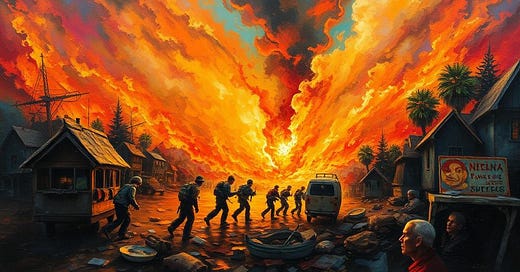It was a warm, drizzly night when suddenly the power went out as I was sitting at my computer desk. The urgency to the situation was added by sirens growing nearer and nearer to our home’s proximity and I could hear my teen cry out, “Mom!”
The fire alarm went off. Not just our apartment but the building alarm. The cats ran under my bed for shelter. I got up from my desk and ran to the balcony door to take a peak and was met with a ferocious wall of fire merely a block away. It towered over our four-story building and I yelled to my teen to pack a bag because we needed to get the fuck out now.
Never have I been in such an urgent situation until that point in 2023 where the possibility of running from a fire could have meant life or death. It was a quick lesson in emergency preparedness, or lack thereof, where everyone around me could lose it all in a moment’s notice. Luckily, our building was spared thanks to firefighters.
That block fire took out a total four homes, an apartment building construction site, and an adjacent condo building. Hundreds of people displaced. The fire wasn’t settled until the following afternoon by four fire engines, two coming from out-of-town jurisdictions.
This happened exactly one month after my purchase of an electric vehicle, to the day. All irony aside, I can’t tell you what a relief it was to unplug my fully charged car and bolt with my kid to a safer venue that night.
The fall of 2023 found me inside a Communications class presenting a how-to about wildfire preparations coming to a neighborhood near you. You could sense the alarm from my audience as I attempted to use persuasive language and entice everyone into the belief that our climate has changed without the transitions needed to curb what we were now experiencing.
Fast forward to July 2025 and suddenly I’m reading an interview with David Suzuki in IPolitics that we have lost the climate fight and now need to hunker down and do the best we can with the neighbors and resources we currently have.
Additionally, according to a www.intellinews.com report of a study published on July 2, 2025, a major ocean current located in the Southern Hemisphere has reversed direction which is causing great alarm among climate scientists.
Apparently, this South Atlantic ocean current normally pulls cold, nutrient-rich water up from the ocean floor which drives planetary heat distribution. The alarm originates from the collapse of this carbon sink which traps vast amounts of carbon in deep-ocean reservoirs that will now release its carbon into the atmosphere. The role of this particular carbon sink absorbs approximately 25% of all anthropogenic CO2 emissions. According to this study, the role of the ocean current has now ended, which renders the climate (by ICM-CSIC scientists, El Institut de Ciencies del Mar in Spain) from “chronic climate stress” into “acute systemic breakdown.”
What To Do
Disclaimer: I’m not a scientist, nor an emergency preparedness expert so please feel free to constructively scrutinize this list if you have further advice that could help more people.
PLAN: Hope for the best and prepare for the worst.
·Create a nonperishable stash. This means the next big shop to your favourite store like Costco, Canadian Tire, London Drugs, et al. needs to include high calorie essentials. Some examples from my list include teriyaki beef jerky, canned meats, dried fruits, canned veggies, instant sticky rice, canned soups, bottled water. Check expiry dates.
·Grab that duffle bag we all have. If fleeing the scene becomes imperative, you’ll want to have all the essentials available if the situation takes you on the road. Organize with your neighbors who may need an adjacent escape plan who live with a disability or do not have a vehicle. Pack that tent, sleeping bag, blanket, and pillow.
·Pack your books! Living in a moment of survival, humans are capable of shocking behaviours. Books are a great source of mental hygiene when energy sources become scarce and your phone becomes a lifeline.
·Clothing: make sure you have a few days of comfortable clothes that won’t stress your need to stay covered or your wallet. Too much is always better.
·Toiletries & medications: Have an extra supply on hand in case of a lapse in public services. Kleenex boxes are a great way to keep tissues safe from potential soilage.
·Remember the sanitation ads warning against flushing disposable wipes down the toilet? Bring a box anyway. You never know if a shower is days away.
Take pictures! Insurance claims will want proof of your contents if you’re making a claim. Check your deductible.
·Cash. If there’s no electricity, your bank balance won’t mean a damn if it’s not visible to others. Small denominations like $5 or $10 or toonies or loonies could make the difference between having or not having if there’s no change possible.
· Signs. If you’re forced to stay in place, leave a visible sign for emergency crews which could help save more lives who need immediate help if you do not. If you need immediate help, first responders could be quickly notified.
· First aid kit, bug spray, sunscreen, pepper spray.
· Crank radio. You’ll want to stay up to date if there’s centralized information you trust being broadcasted from sources like the CBC or other mainstream news outlets.
· Emergency Contacts: making prior arrangements to meet up with those you are comfortable collaborating with during an emergency could make all the difference if no muster points are nearby. Make sure your loved ones know you are okay and visa versa which can provide a level of relief to a potentially desperate situation.
·Get the App ALERTABLE or Voyent Alert!: you will be forewarned of any emergencies your municipality or city provides regarding local events that can help you make better and more informed decisions.
I hope this post finds you better prepared juxtaposed to my situation two years ago. Please do yourself a solid and learn from my mistakes. Let’s help protect where it matters most.





